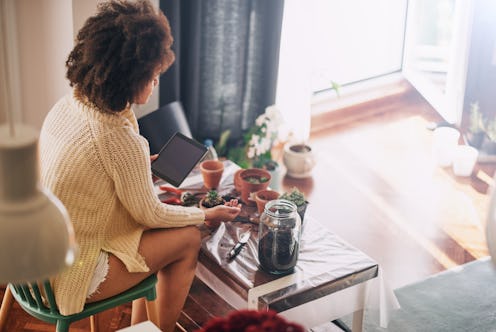Life
Why You Want Plants So Badly Right Now, According To Experts

Over the last few years, plants have held court as one of the most prized props for Instagram pictures, but as of this spring, plants are no longer accessories — they're friends, they're hobbies, and they're sustenance. Now, people are less satisfied with low-maintenance snake plants and succulents, and they are taking on more vulnerable plants and herbs to care for, because that's the point.
According to Annie, 28, a new plant mom who is also now experimenting with a greenish thumb, planting is popular during quarantine because it's purposeful. "One of the most exciting parts of my day is going downstairs in the morning to water and check on my plants," Annie tells Bustle. "I love to observe how they become more full, how how they flower, how they grow new leaves, and how they change over time — I'm invested in their journey," she adds.
According to experts, collecting and caring for plants is beneficial for mental health. Gardening can improve mental wellbeing by reducing anxiety and alleviating some effects of depression. Annie attests to this idea, saying that she's been known to squeal with delight at the sight of new growth or a happy looking plant after a brush with death. "It feels good to take care of something, and see that it's doing well, it's like 'I did that!' and it makes me feel good about myself, and calm," she says.
For Reagan Kastner, owner of online plant shop and plant design firm STYLUSH, the increased interest in plants comes from a desire to go back to basics. "We live in a world where we have been disconnected with nature and are not working with our hands. I believe that having houseplants in our home feeds the part of our soul that is missing that," she says. And while self-care might be having its moment, it's hard to measure just how well you're taking care of yourself. If you've blown through a mega pack of face masks and done a lot of virtual yoga, is your care tank full? To Kastner, plant care is a more measurable performance of self-care. "In a way, it’s a reflection of the care you are putting into yourself."
But to herbalist Eva Giorgi, who grows her own food and teaches others how to create tinctures, teas and supplements, the appeal of caring for plants and gardening is the secret dynamic. "It fulfills the human desire for both liberation and control," she says. With creation, there is liberation, and with care, there is control. When it comes to growing edible plants, Giorgi says that "building, designing and maintaining the conditions needed to grow your own food is purposeful work."
Taylor, 25, is a long-time plant mom and a new vegetable gardening enthusiast who has put her energy towards botanical matters during quarantine. "I did not like feeling out of control, and like I had no purpose when I was furloughed. Gardening and adding more plants to my indoor collection not only gave me something to do, but something to be proud of," she says, adding that watching her plants grow over the last few weeks has made her feel productive, and also surprisingly independent. "It was also a reminder that I can be self-sufficient and community-oriented," Taylor adds, noting that this became important to her for the first time during the pandemic.
Whether you're caring for a fiddle-leaf fig in your living room or a fully loaded vegetable garden in your backyard, Giorgi says that part of the pleasure in caring for any living plant is that it reminds us that we are part of a bigger picture. "Even to grow indoor herbs, mint on the windowsill, is gentle nod to the sentiment that the earth takes care of its inhabitants, as long as we take care of it," she says. For Girorgi, touching, smelling, and caring for the the plants that grow the food that she eats and the flowers that she steeps for tea and decorates her home with, is a way to "live immediately during uncertainty."
Sources:
Reagan Kastner, owner of STYLUSH
Eva Giorgi, herbalist practicing with Katonah Yoga in New York
This article was originally published on